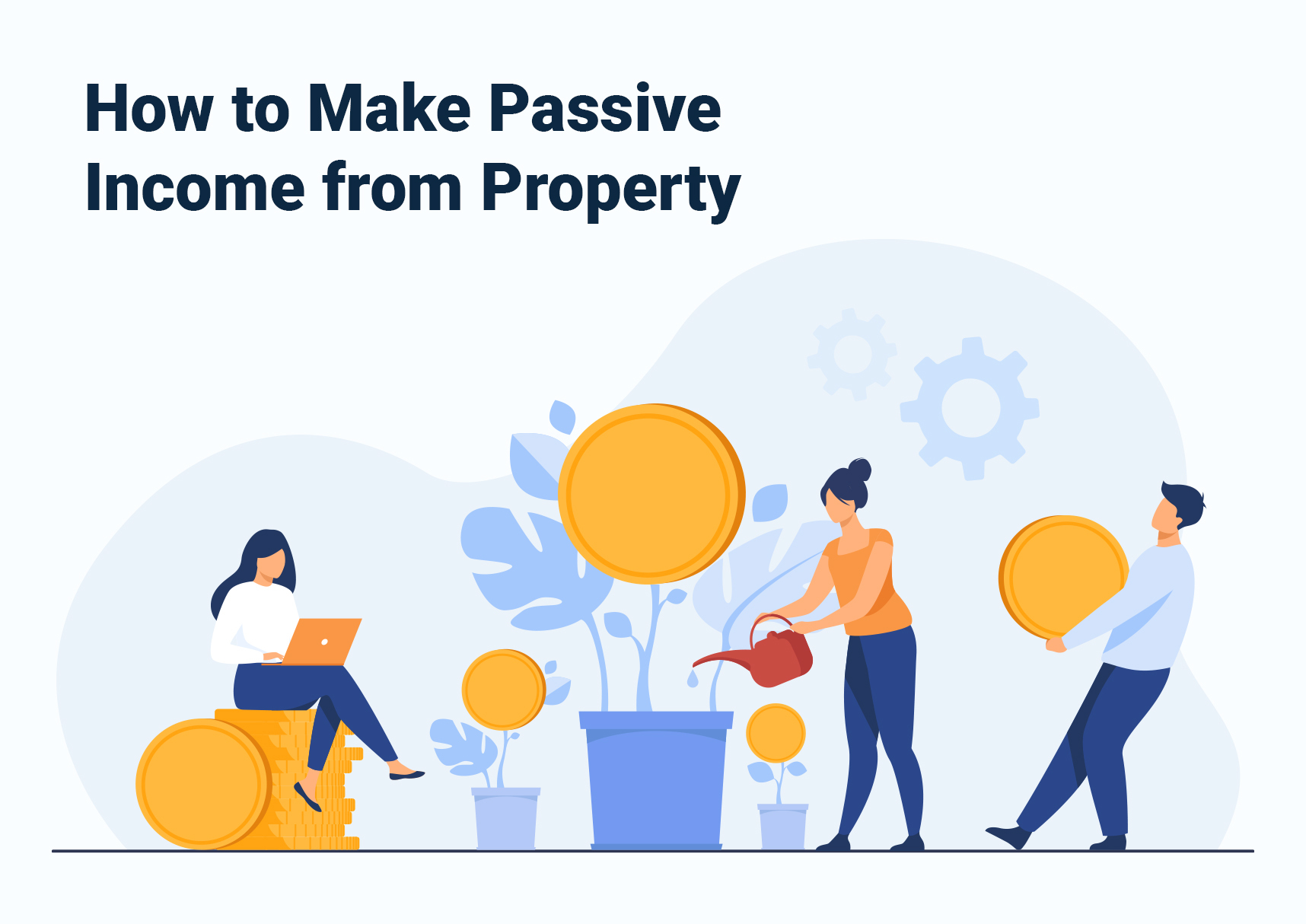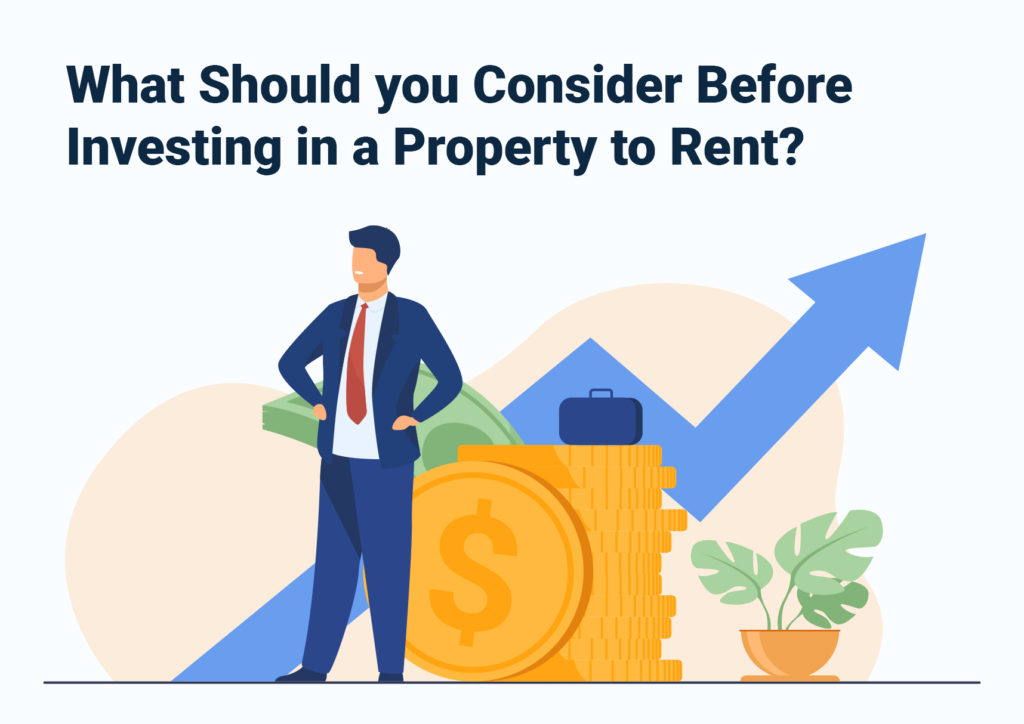How to Make Passive Income from Property

In this article, we take a close look at how to make secondary income! Also, consider how to make passive income from property, explore tips for first-time investors and outline the common pitfalls to avoid.
Generating passive income from a rental property is a great way to achieve an additional source of revenue. This will move you a step further on the road to financial freedom.
The opportunity to gain passive income is one of the major reasons that investors choose to put their money in real estate. Before embarking on any property investment, you’ll need to consider if it’s the right fit. In terms of your current lifestyle, financial situation and goals.
What is Passive Income?
Passive income is a source of revenue that continues to deliver even after work is complete. It is a strategy that allows investors to create earnings without necessarily being actively involved.
In terms of how to make passive income from real estate, passive income is usually in the form of monthly rent from tenants. Buying then renting out a property is a good way to make secondary income. But it’s not necessarily free of work, so it’s important to get to grips with the level of involvement required.
Another way to make passive income from property is through flipping houses. This involves buying an inexpensive home, renovating it and selling it for a profit. It does require some active involvement upfront, but once all the work is done investors can reap the rewards without any further effort. Flipping houses can be highly profitable if done correctly and can create a steady stream of passive income over time.
Finally, another way to make passive income from property is by investing in real estate investment trusts (REITs). REITs are a great option for those who want to diversify their portfolio.
Getting property income outside of your dayjob can boost your net worth and give you peace of mind. Having passive income investments might be a good strategy for those looking to:
- Boost retirement savings
- Pay off debts
- Reach wealth goals such as financial freedom
- Grow savings
What is Residual Income?
Passive income tends to indicate that little or no ongoing effort is involved. Whereas, for most property investors “residual income” is usually a more appropriate term.
Monthly residual income is the money that remains after expenses are paid.
For example, residual income on a rented property would mean deducting expenses like mortgage payments, wear and tear costs and any tax that applies. The monthly residual income would be the money that remains.
It is important to remember that residual income is not the same as passive income. Passive income refers to the money generated without any effort from the investor, whereas residual income requires a certain level of effort from the investor. Residual income can be an excellent source of additional revenue for property investors, provided they have a thorough understanding of their expenses and are willing to put in the effort required to maintain their properties.
 How to Make Passive Income from Property
How to Make Passive Income from Property
Property income usually comes in through rental properties. If an investor chooses the right property in the right location, it’s certainly possible to create steady monthly income from tenants. Later down the line, you should be able to gain a lump sum. Namely from an increase in the value of your investment property when the time comes to sell the property.
It’s important to realise that generating passive income from property does require some work up front. Searching for properties, screening tenants, undertaking any renovations and improvements, ensuring the property is up to code and ensuring the property can legally be rented out all requires some leg work. Mening an active role from an investor, especially if you are keen to maximise profit.
Once these steps have been completed, there are a few strategies that can be employed to generate passive income from the property. Whichever strategy you decide upon, it’s important to remember that all passive income takes time and effort to cultivate and maintain. You should always research thoroughly before investing any money into any venture, and consider all of the risks involved before making any decisions.
If you’d like to learn more, check out our article on How to Make Money from Property Investment.

What you Need to Know Before Making Passive Income from Property
Be in the Right Financial Situation
Before deciding to invest in any investment property, it’s important to ensure you are in a secure financial situation. Ideally, you should be debt-free before buying an investment property. It’s also wise for investors to have an emergency fund in place that can be used to handle unpredictable costs that may arise such as repairs, defaults on rent or if the property is vacant between renters.
Get the Right Investment Property
Before buying any property you’ll need to decide on your overall aim. Do you want an apartment that may have regular renters for a longer period of time? Would you prefer to target the student market and invest in an HMO? Or do you want to rent out a house with the goal of selling for profit within a few years? Coming up with a broader investment strategy will help you find the answer to questions like these and give your search for a property more focus.
Consider the Upfront Work Required
If you’re considering your first property investment or you prefer to take on a smaller project, you’ll want to find something that is close to move-in-ready and attractive to tenants. More experienced investors, or those with more time and money to spare may consider a property that needs more work putting into it, whether that’s repairs or refurbishing.
Create a Sound Business Strategy
Ensuring your passive income investment is successful involves planning and creating a business strategy that will help you to meet your aims. You’ll need to fully understand your target market, know the neighbourhood or area you are investing in, pick out the best type of property, and understand the market to generate passive income. After you have decided on a property, you’ll need to put a strategy in place to manage tenants, paperwork, finances and the property itself.
Consider Hiring a Property Management Company
If you don’t want to handle the day to day work of running an investment property yourself, you can hire a property management company. They will be able to handle things like the search for tenants, collecting rental income and dealing with any issues such as repairs or when things don’t go according to plan. You’ll usually have to pay a property management company commission, but in return you get peace of mind that everything will be running smoothly.
Choose the Right Market
When it comes to finding a property that will generate monthly passive income, location is one of the most important factors. From demand for property to the local amenities available, finding the right property in the right place can determine how profitable your property will be.
Generally, when considering how to make passive income, investors can choose between an established market and one that is up and coming. Established markets tend to be lower risk, generally more secure and consistent and likely to deliver immediate returns to investors. On the other hand, emerging markets tend to be more affordable and likely to experience faster growth over time.
Consider the Amenities on Offer
The next thing to keep in mind is the amenities in the area. This can be a good indicator that your investment will be profitable. Properties in proximity to good schools, supermarkets, nightlife, restaurants, recreational facilities and career opportunities, as well as proximity to public transport, tend to deliver higher yields and faster growth. Many investors will choose an investment property in their local area or close to home. Mostly because they already have an understanding of the area and will be able to check on the property easily when necessary.
What Should you Consider Before Investing in a Property to Rent?
Before investing in any rental property, it’s important to understand the costs involved, which can include the following:
- If you’re investing in a property, it’s likely that it is not your first home. If this is the case, you’ll need to pay an extra 3% of the total value of the property stamp duty tax.
- You’ll also have to pay 25% of the total property price as a deposit.
- When you begin to generate rental income, you may be liable to pay income tax as well (which applies if you are above the £12,500 tax-free threshold).
- It’s also important to consider the maintenance costs of the property.
- You’ll need to make sure that you have enough money available to cover any periods where you don’t receive an income.
Passive Income Mistakes to Avoid
When it comes to how to make passive income as a landlord, there are a few common mistakes to avoid. Especially from the outset, in order to make your investment work at its optimal for you.
Cash-Flow
When owning a property the ideal goal is to gain capital appreciation while earning steady cash flow each month. While your capital appreciation will fluctuate over time, cash flow will become your bottom line to provide a monthly income and take care of the property – including mortgage payments, repairs etc. It’s important to ensure that the amount coming in covers your outgoings.
Carefully Screen Tenants
As a landlord you’ll want to find the best possible tenants for your property. Bad tenants can turn out to be extremely costly. Whether that’s in terms of damage to a property, defaulting on rent or having to undertake a lengthy eviction process. Taking the time to screen tenants properly, checking their credit history and references can save you a lot of hassle down the line.
Stay Organised
New investors should understand everything that is involved with becoming a landlord. Not something to be taken lightly, managing a property should be approached as if running a small business. Landlords should be clear on rules and hold tenants accountable. ALso, actively manage their property by staying in regular contact – either with tenants or with the property management company. The proper management of a property will reduce tenant turnover, improve property value and reduce risk.
Keep Tenants Happy
Perhaps one of the most important – and easiest – ways to keep your property generating monthly passive income is to make sure you address the needs of tenants in a timely manner. Ensure that the rental unit is in good condition before anyone moves in and deal with issues or problems as soon as possible, especially urgent tenant requests.
When it comes to how to make passive income from property, becoming a landlord can be a great way to generate additional revenue towards your financial goals. By making a strategy, getting a handle on cash flow and understanding that becoming a landlord is not completely without work, you can avoid many common pitfalls that some investors make to ensure your property as profitable as possible.
FAQs
How many houses do you need for a passive income?
There’s no hard rule to how many properties you’d need to generate monthly passive income. The majority of investors – currently more than 70% – tend to stop at one property. The number of properties you want to invest in will depend on your financial situation, the amount of time you have to spare and your appetite for risk.
For example, if you have a large amount of capital and want to take on more risk, you could invest in multiple properties. On the other hand, if you have limited capital and want to minimize risk, then one property may be the right choice for you. Ultimately, the number of properties you need for passive income depends on your individual goals.
Can I buy multiple houses at once?
While it’s possible to buy multiple houses at the same time to generate multiple passive income streams, whether this is right for you will depend on your lender and whether you can acquire multiple mortgages. In theory, you can have as many mortgages as you would like. In reality, it will depend on what the lender is willing to offer.
Many lenders will limit an investor to one or two mortgages, others will have no restrictions whatsoever. But only if you can come up with the deposit and can show how you will make the repayments. The amount of rental income you need for a mortgage to be granted varies from lender to lender. Generally speaking, some want it to be 150% of the mortgage repayments each month. Others may be slightly lower at 125%.
Why Do You Need Passive Income?
Passive income from rental property is nice to have. It gives you security, and can have a positive impact on your financial well being. While not a necessity, it can certainly go a long way in helping you reach your financial goals.
It can also provide a cushion for unexpected expenses or emergencies. Plus, having a source of passive income allows you to have more financial freedom and can increase your overall financial security.
For those just starting out, passive income from rental property can be an excellent way to begin building wealth.


